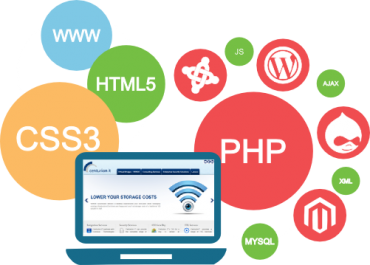It’s one thing to fill your website with copy, pictures, videos and so on; it’s quite another to organise, modify and edit it. Hence the need for an excellent Content Management System – or CMS.
And as you would expect, there are plenty of systems to choose from, each promising to be better than the rest. How do you choose? You don’t, you leave that to your website development team on the Sunshine Coast!
The best known and possibly the best systems are WordPress, Joomla and Drupal.
But isn’t WordPress just for blogs? Originally, yes, it was used as a blogging platform but time passes, systems improve, and today WordPress is used on many non-blog websites.
Fun and Functional
There are many reasons why WordPress is so often used in web development solutions, such as its huge range of themes, plugins and widgets. It is a fun, functional CMS that is quite straightforward to use and, due to its popularity, there are no shortage of forums and tutorials if you need help.
As with many systems, however, WordPress needs additional security features to keep your site safe, and that’s something that a professional web development Sunshine Coast company can help you with.
The reason why Joomla is becoming increasingly popular is that it is seen as being very secure. And proof of that is its use by such major corporations as Citibank and Harvard University!
It is certainly a more complex system than WordPress and one that should be applied by professional web development solutions experts. Like WordPress, it offers plenty of themes, but the focus is more on functionality, making it ideal for things like business directories and reservation systems.
High-end choice
Drupal is another CMS popular with high-end companies, such as Sony Music and the New York Observer.
There is no shortage of features and tools, and the Drupal community is very active in terms of forums and live events.
Is it the right choice for your website? That’s a question for a website development Sunshine Coast company, as it’s a hard one to answer. Drupal is a complex CMS, easy to extend due to its huge number of modules, but its theme system isn’t simple and, to be honest, it could be overkill on certain sites.
All three of these systems recently made the Top 10 of the Best CMS for 2016 list, so you can see that, on the surface at least, there’s not much between them.
Right choice for you
But in order to match one of these – or another CMS altogether – to your needs is something only a web development Sunshine Coast company can tell you.
Choosing a CMS is not an off-the-shelf decision. Although that’s exactly what a lot of people do, and then despair when it’s not the right choice for their needs. As with any system, the choice is based on many different factors, such as the size and type of business, what the site needs to do, who will be using it, and so on.
Professionals who deal with web development solutions every day can assess your business’s needs quickly and efficiently to ensure you get the right solutions first time around.
Central to success
Your CMS is central to the success of your website and, with content, functionality and speed more important than ever to users, this is a basic step you must get right.
Without a CMS it’s hard to keep track of what’s on your site, where it is, when it was last updated, and so on. The CMS carries content right through from creation to archiving, improves the structure of the site, the look of the pages, as well as the all-important navigation.
The choice of CMS can affect many aspects of a business operation and certainly earns its keep, through reduced site maintenance costs, increased security and the ever improving functionality needed to attract more users.
There are tangible results to be seen, such as improved communication and increased sales.
Life before Content Management Systems was very different. A business owner would send changes through to the web developer, who would type them in plain text to update the site. When very basic CMS programs appeared in the late 90s, it was a breakthrough.
There still weren’t that many choices or tools, and the user experience was still pretty basic.
Today you’d be hard-pressed to find a website NOT using a CMS! It’s easy, and relatively cheap to get started, with the ease of adding more extra options later.
Drupal was first
Most people think WordPress was the original CMS, but it was, in fact, Drupal – and it’s creation was practically an accident!
Working on his PhD dissertation in Computer Science, Belgium student Dries Buytaert began to explore wireless internet. He and his colleagues decided to build a Local Area Network, which lead to the need for a Message Board. When he graduated, Buytaert moved the Message Board to a live website and, around 2000, Drupal was born.
WordPress was released in May 2003 by its founders, Matt Mullenweg and Mike Little. As of January 2015, WordPress was used by 23.3% of the top 10 million websites, and is the most popular blogging system in use on the Web.
Joomla was launched in 2005.
Simon Jones is a journalist with many years’ experience in news reporting, editing and feature writing. Isobel writes extensively about trends in website design and the use of Content Management Systems as a web development solutions tool.

